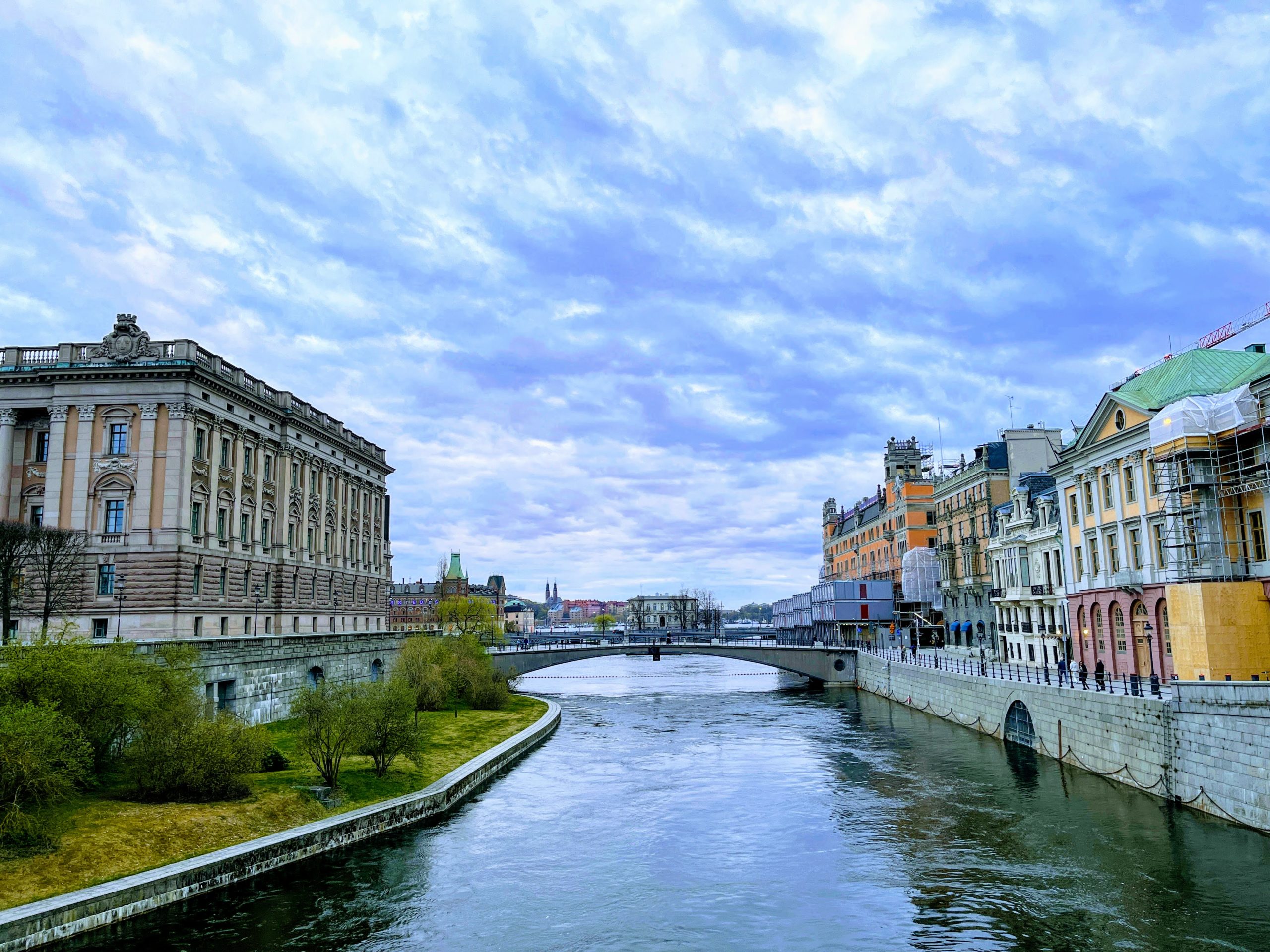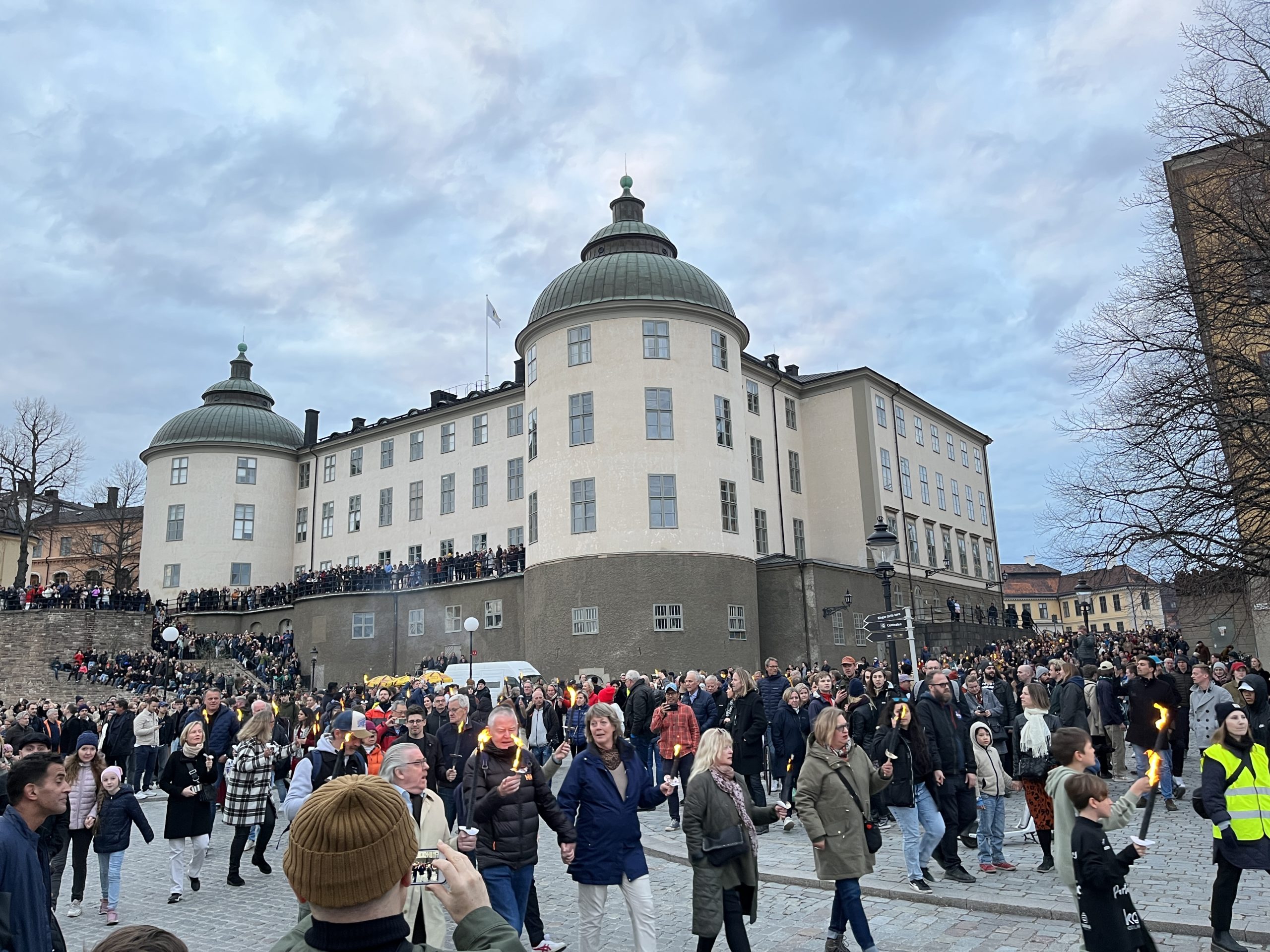
‘Sista April’ or the last of April is also known as Valborg (‘Walpurgis night’ in English). The evening before May day. Although Christianized in name and purpose in the 1600s, originally it was more like the Gaelic May day celebration Beltane, where a fire and ceremony is held to encourage good fertile soil, good crops, and fecund livestock safe from predators and disease. Good old fashioned nature reverence!
In the swing from pagan to Catholic to Lutheran to secular, Sweden has kept the oldest Valborg traditions around: light a giant bonfire in the evening and gather to sing, maybe have a snack, and look forward to the summer. In Stockholm the proximity to Labour day (May 1st in most of the world) means there is also a union demonstration where union representatives and Social Democratic party reps have a parade with torches, makes some speeches, and then light the fire. This even hasn’t been held the last couple of years due to the pandemic, so we went to our first Stockholm Valborg this year. Quite a step up from the little community version in Gävle! We went together with friends Linda and Linn and got the inside scoop from their experienced perspective.
Though Sweden is a lot like Canada in many ways, being here gives a different perspective on culture, religion, and politics that might otherwise have been an invisible part of the background. More than just the narcissism of minor differences, there is a different sensibility here that informs the approach to many issues. Shortly after Valborg, the US Supreme court opinion was leaked that telegraphed a coming dissolution of abortion rights in the US, and there was lots of news coverage and commentary in English and Swedish. Fertility rites to reproductive justice.
In Sweden abortion was officially made legal in 1938, but of course abortions were performed here (and elsewhere) long before that. This original law required approval from the committee based on health risks to the pregnant person, pregnancies resulting from rape, fetal abnormalities, and eugenical reasons (!) which I presume stems from fascist notions of eliminating ‘undesirable traits’. In 1974 the law was updated to release all decision making power entirely to the pregnant person, for absolutely any reason with no explanation needed, up to 18 weeks. Exceptions for health reasons are granted after this date, but the total number is about 34,000 per year spread among a population of 10 million people – this is a pretty low rate, and likely reflects the high quality of sex education, contraception availability, and (relatively)low taboos around discussing or planning for sexuality. Children that are born in Sweden are supported by the social safety net starting with pre-natal care: government-funded healthcare, extensive parental leave and childcare policies, subsidized daycare, good schools, free university.
Reading about the trigger laws in Oklahoma and the impact on Indigenous nations, showed some parallels with Sweden and reminded me of the contradictions in social policy and community values that exist in North American settler society. My understanding of Cree and Métis society is that children are centred, respected, and protected by the community and this is a central guiding social value. At the same time, caring for current family members and ensuring enough resources for the community’s children has meant planning family size and birth rate to give everyone a better chance of a healthy and successful life. Sarah Adams-Cornell of Choctaw nation said: “Indigenous women have always known how to care for our bodies. We have always known to go to other women when we need abortions, when we need care.” Forced birth is of a piece with the forced sterilization that Indigenous women (and other women of colour) have also endured; it gives lie to the assertions of ‘pro-life’ and demonstrates a deeper motive of control. I appreciated this quote from Methodist Pastor Dave Barnhart. It has the unsophisticated origins of a facebook post rather than a thesis or book chapter, but I liked the perspective: “The unborn” are a convenient group of people to advocate for. They never make demands of you; they are morally uncomplicated, unlike the incarcerated, addicted, or the chronically poor; they don’t resent your condescension or complain that you are not politically correct; unlike widows, they don’t ask you to question patriarchy; unlike orphans, they don’t need money, education, or childcare; unlike aliens, they don’t bring all that racial, cultural, and religious baggage that you dislike; they allow you to feel good about yourself without any work at creating or maintaining relationships; and when they are born, you can forget about them, because they cease to be unborn. It’s almost as if, by being born, they have died to you. You can love the unborn and advocate for them without substantially challenging your own wealth, power, or privilege, without re-imagining social structures, apologizing, or making reparations to anyone. They are, in short, the perfect people to love if you want to claim you love Jesus but actually dislike people who breathe. Prisoners? Immigrants? The sick? The poor? Widows? Orphans? All the groups that are specifically mentioned in the Bible? They all get thrown under the bus for the unborn.
Up next: Stay tuned for more nice light reading about life in Sweden!





